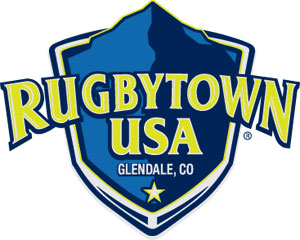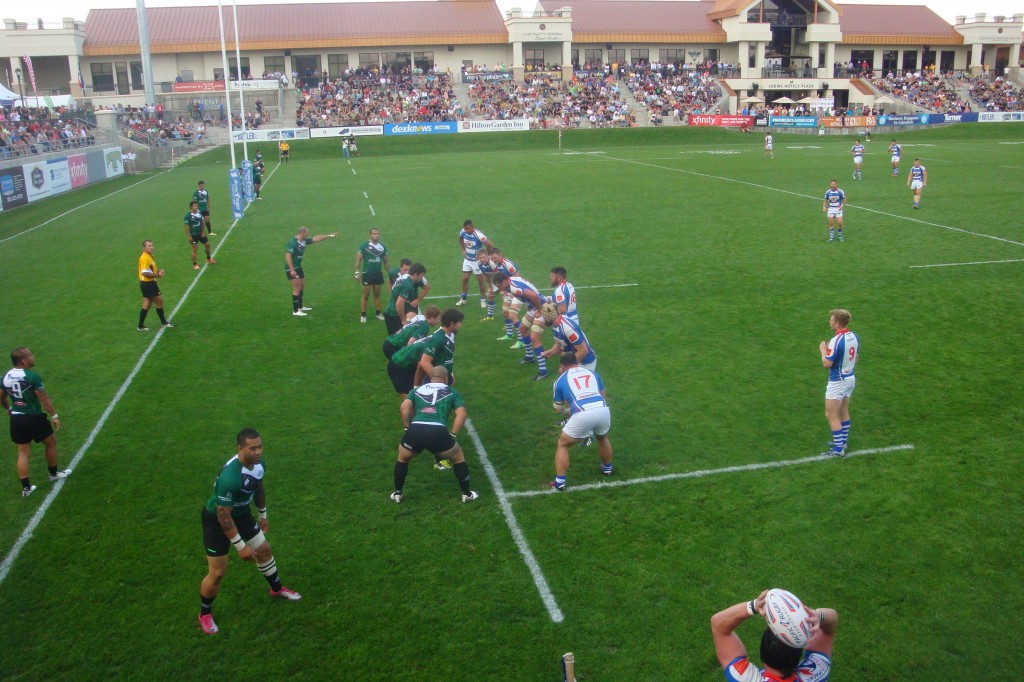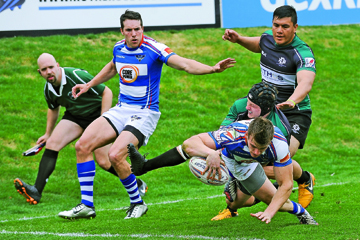
by Valley Gadfly | May 27, 2014 | Glendale City News
by Glen Richardson
When the Glendale Raptors and San Francisco Golden Gate went toe to toe in the deciding clash of the inaugural Pacific Rugby Premiership season at Infinity Park May 17, it produced a match the likes of which even the best script writers couldn’t conjure up. Accompanying incredibly good rugby was a stack of subplots together with a controversial referee call that kept the huge crowd on the edge of their seats until the final whistle.
the final whistle.
There have been some monumental rugby games here — the Collegiate All-Stars, two Churchill Cups, and the North American Four among others — but none that have created more excitement and drama highlighted by bruising hits and jaw dropping tries. There were five lead changes during the 80-minute contest, but despite an up-and-under try by Glendale Center Chad London in the waning minutes, the Raptors came up one point short, 39-38.
Making the game all the more remarkable is that the Raptors were ranked at the bottom of the Pacific League’s power rankings at the start of the season. Going into the playoff, however, the Raptors were ranked number one with an 11-1 record, two games ahead of San Francisco. In their previous match-ups during the season they were tied with a win apiece.
Seesaw Action Game
Despite San Francisco’s early domination, Glendale moved surreptitiously back into the game with two quick bang-bang scores due to Golden Gate penalties. Fullback Dustin Croy scored first compliments of convincing decoy runs from Centers Landon and Justin Pauga. Then Pauga scored again after bouncing off a Golden Gate player at the try line and the Raptors had erased SF’s lead. Just as San Francisco threatened to score again, flanker Spencer Scott poached the ball and passed off to wing Bret Willis who scampered down field to score. With the conversion good, Glendale had a 24-15 halftime lead.
A nifty scramble by Golden Gate had them within inches of the try line to open the second period. On the next play San Francisco scored but the conversion was missed leaving the Raptors up 24-20. A penalty on the Raptors followed by big SF runs plus an easy conversion put them up 27-24. Kicking the restart deep Golden Gate cleared its lines with a boot. Glendale’s Croy committed two defenders and passed to Preston Bryant who moved downfield and passed to London. Following broken tackles and a ruck, Scot took the ball untouched for anther Glendale score. Graham converted and the Raptors were back on top 31-27 with 30 minutes remaining. Golden Gate hit back within minutes with a quick try to get revenge and back into the game. The conversion was missed, but they had reclaimed the lead 32-31.
Just as quickly Glendale’s Croy dotted down in touch. Believing Glendale had gone ahead for good, players and fans went delirious with excitement. After watching two video reviews, however, the points were wiped off the scoreboard as referees ruled that while Croy did dot down, he was touched before he could do so. With five minutes to go Glendale was caught playing the ball in a ruck. SF kicked the penalty to the corner and took a lineout. With a short plunge and conversion they were up 39-31. Down eight points with less than five minutes to play, Mike Graham chipped a kick over the defense and reserve wing Max Statler gathered the ball and passed to London who raced in for a Glendale score. With a penalty following the kickoff, the Raptors kicked for a lineout inside SF’s 22. Glendale won the set piece but Graham opted to grubber down one point and San Francisco scooped up the ball and kicked it to touch to end the game.

by Mark Smiley | Apr 29, 2014 | Glendale City News
May 17 At Infinity Park
by Scott Krieger|
Writer for and on behalf of the City of Glendale
On Saturday May 17 at 3 p.m. the Glendale Raptors will battle it out in all likelihood against strong rival San Francisco Golden Gate Rugby Club (SFGG) for the championship of the newly formed Pacific Rugby Premiership (PRP). The new league is composed of seven top clubs in Denver and the West Coast and is considered to have a lot of the top rugby teams in the nation. But the disbandment of the rugby Super League and then the Elite Cup has resulted in there being no national championship this year containing all the top teams in the country. It is hoped that an Atlantic Rugby Premiership can be formed so all the top teams will vie for a national title next year, but there are no assurances that the same will occur.
Pacific Rugby Premiership (PRP). The new league is composed of seven top clubs in Denver and the West Coast and is considered to have a lot of the top rugby teams in the nation. But the disbandment of the rugby Super League and then the Elite Cup has resulted in there being no national championship this year containing all the top teams in the country. It is hoped that an Atlantic Rugby Premiership can be formed so all the top teams will vie for a national title next year, but there are no assurances that the same will occur.
In the meantime the Raptor-SFGG match is creating great anticipation. Glendale is on top of the PRP standing with only one loss but that loss was to SFGG out in San Francisco by the score of 31-26 in a seesaw match. A second regularly scheduled match between the clubs is set for for May 3, in Glendale ending the 14 week regular season of the PRP.
The PRP is set up to be a pipeline for the USA Eagles. In years past in the Super League, the level of competition varied to the point that many matches were decided by a large point margin. The PRP, more selective with its members, has reduced that component of the game and funneled both a great amount of talent and pointed coaching into each match, every week.
The premiership is still in the early stages of its existence, and plans to keep growing. It is already looking to integrate a new member, Park City Haggis, next season.
“The PRP has definitely proven to be the highest level of competition,” Glendale captain and seven-time Team USA member Zach Fenoglio said. “Hopefully the PRP has learned from the things that made the Super League great and will only lead to more success and higher competition for years to come.”
The seven clubs that make up the league already have a rich history in the development of the sport in the western United States, and ideally the PRP will only further that and continue the growth of the game.
Olympic Club traces its incredible roots back over 100 years to its founding in 1908. That year, they competed against teams from Stanford, California, and the University of Pacific. Not long after, they began an international search for more demanding competition. In 1913 they played a vaunted New Zealand club, and although they took the loss, it was much more of a match than even the USA National team put up against the All Blacks. In the 1960s, when most western rugby teams were just being formed, O-Club was reaching their peak of dominance, both domestically and overseas. The club has continued both touring and attracting new talent for the last 30 years. This season has fallen short of expectations, as the team is in seventh place with a record of 2-7.
Old Mission Beach Athletic Club (OMBAC) began playing rugby in 1954, initially only to satisfy the desire for organized competition. In 1966, team members were granted a petition to be sponsored in San Diego, and set off down the road of competitive play. Later in the 1960s, San Diego State graduates flocked to the club, instilling a new level of talent and athleticism. OMBAC was the first team to win both the 15s and 7s National Championships, and have done so many times over. The club took the full-side championships in 1988, ’89, ’91, ’93, ’94 and ’96, and continue to compete with the highest level of rugby clubs in the country. OMBAC is 4-3-1 and in fifth place in the standings.
Known around Southern California as Belmont Shore Rugby Club, the club was originally formed in 1964 as the Long Beach Rugby Club. Original founders were comprised mostly of Long Beach State football players as well as members of the United States Coast Guard. The team first started thriving in the ’80s, evolving then to be known as Belmont Shore. It was around this time they began to attract international talent and truly grew into a powerhouse. Belmont won its first National Championship in 1998, beating New York Old Blue. They used this as a springboard as they entered a decade of dominance, which has continued into their inception into the PRP. Shore is in third place in the PRP this year with a record of 5-4.
Founded a few short years after Belmont, the Denver Barbarians came to be in 1967. The first major post-collegiate rugby club in the region, the Barbos were initially formed by a collection of ex-college ruggers as well as lacrosse players in search of new competition. The club really did serve as pioneers for professional rugby in the region, as by the spring of 1968 three more teams had formed with more on the way. Denver won the National Championship in 1990 and has been competing at high levels both in 15s and 7s ever since. The Barbarians have fallen to fourth place this season after two recent losses to Glendale.
The early 1970s witnessed the birth of yet another powerhouse rugby club. Santa Monica Rugby Club was established in 1972 by graduates and rugby players of surrounding schools like UCLA and USC. The team found success almost immediately, traveling to a number of National Championships over the years, and taking home the title in both 2005 and 2006. Currently, they occupy sixth place in the league.
1988 brought forth the birth of San Francisco Golden Gate after the merger of two Division II teams, Barbary Coast and the Castaways. Throughout the ’90s, the team was a staple in the Final Four, but never captured the National Title. Over the years, though, SFGG has pumped out numerous players to both the USA Eagles as well as international squads. They have enjoyed sustained success so far this season, and sit in second place in the PRP with a record of 7-2.
Glendale comes in as the new kids on the block. Established in 2007, the Raptors have accomplished much in a short amount of time, serving as a benchmark for the sport and playing in RugbyTown USA. Winning the National Championship in 2011, the Raptors immediately made a name for themselves, and haven’t looked back since. Led by Head Coach Andre Snyman, the club sits atop the PRP standings with a record of 8-1.
Three games remain before the finals at Infinity Park. The Raptors have vastly outperformed expectations thus far this season, displaying premier rugby week after week in their chase for a title. They will travel to California to play the next two matches, before returning home for the final week’s match on May 3. “I want to keep the players focused and mentally sound by not burning them out with information overload but instead remaining cool, calm, and collected,” Snyman said.
On a current six-game win streak, the Raptors hope to ride their success through the next three weeks and give the city of Glendale a hometown team to cheer for in the finals at Infinity Park.

by Mark Smiley | Apr 4, 2014 | Glendale City News
by Eiden Hughes
Writer for  and on behalf of the City of Glendale
and on behalf of the City of Glendale
The 2014 Raptors in the Community Program is underway and already connecting members of the Raptors organization to the Greater Metro Denver Area. Giving back to the community is one of the club’s core values. In past years, volunteers from both men’s and women’s squads have donated their time to some of Colorado’s most-dedicated nonprofit organizations through the Raptors in the Community Program.
This year the program has evolved —Denver-based Sign Language XL takes over the title of presenting sponsor, and a new level of volunteer, the Ambassador, has been introduced.
Sign Language XL is one of the country’s leaders in digital printing, who pride themselves on their ability to provide vibrant, high resolution images on any scale and on virtually any substrate. In Denver, their finished products are visible at Pepsi Center, Dick’s Sporting Goods Park, First Bank Center in Broomfield and, of course, Infinity Park.
The Raptors have also added an advanced level of volunteer to the ranks, called the Ambassador. While volunteer opportunities are still available on a regular basis for everyone within the Glendale Raptors, the Ambassadors take their volunteerism to the next level. They will be considered the go-to representatives of the team for all outreach initiatives.
The Ambassadors, known as the Elite Eight, endured rigorous interviews and are committed to donating a minimum of four hours per month (in addition to their full-time jobs, and training, playing and traveling for rugby) to various charitable activities and outreach programs.
The Raptors Ambassadors for 2014 are: Men’s Team Captain Zach Fenoglio, Jack Haward, Joanna “JoJo” Kitlinski, Chad London, Joash Peko, Casey Rock, Gedda Rodriguez-Howard and Juliann Tordonato.
“While we had many qualified ambassador candidates, it was apparent in our interviews that these eight truly possess the leadership characteristics and communications skills that are a critical component to the upcoming community service opportunities,” said Glendale Deputy City Manager and Director of Finance Linda Cassaday. “We are proud to have them representing the City of Glendale and the Raptors in the community!”
Recently, the Ambassadors attended Centura Soup for the Soul (March 10) and they visited Children’s Hospital on March 26. Upcoming events include another visit to Children’s Hospital on April 30, and the Kids Running America event in Washington Park on April 27. There are several events slated for the remainder of the year, and new events are being added regularly through the request feature on the RITC portion of the Raptors’ website.
The “Unity” In Community
Perhaps one of the most interesting facts about the eight chosen Ambassadors is that only two of them — Fenoglio and Rock — are Colorado natives. Even so, both have left their native state at one time or another to pursue higher education, realize career ambitions, or even play rugby abroad.
The other six Ambassadors have come to Glendale from far and wide. Haward is a native of England, who first came to Colorado a year ago to play summer mountain rugby in Breckenridge. London is from South Africa, and originally came to the U.S. to attend Palmer College, where he played rugby and became a licensed chiropractor. Rodriguez-Howard rounds out the overseas group, having grown up in Bogota, Columbia, after a move across the Atlantic from Spain.
Peko, Tordonato and Kitlinski hail from the U.S. West Coast, Vermont and Michigan respectively. Regardless of their reasons for moving to Colorado, they, along with the rest of the Raptors, are all united in rugby, and are committed to sharing the sport and making a difference in the community they now call home.
“I wanted to serve as an Ambassador because it seemed like a great way to give back to the community of Glendale, as well as spread the word about the rugby programs,” Tordonato said. “The RITC program offers a unique opportunity to really engage with the community. Being more prominent locally, and really giving back to the city that funds our rugby program, will also help spread the word about our teams and draw more people to games to support the Raptors.”
Pacific Rugby Premiership forward Rock echoed her sentiments, and described the inclusive nature of the sport. “I wanted to serve as an ambassador because it’s such an exciting time to be a part of rugby. The sport is really picking up momentum in this country; not only is it a fast-paced, exciting game, but the culture of rugby is very positive and inclusive. Being an ambassador helps me feel connected to the growth of rugby’s popularity in this community and country, which I’m very proud to be a part of.”
The nature of any community is to be inclusive to its members. Connecting the City of Glendale, the Raptors rugby club and the Greater Denver community is a natural step forward as the sport becomes more prominent in the area, and throughout the country as a whole.

 the final whistle.
the final whistle.
